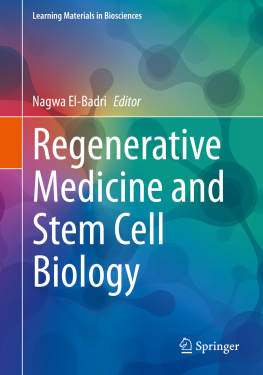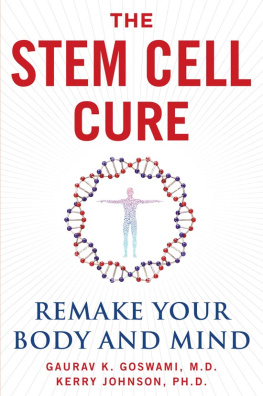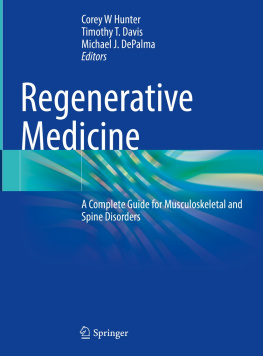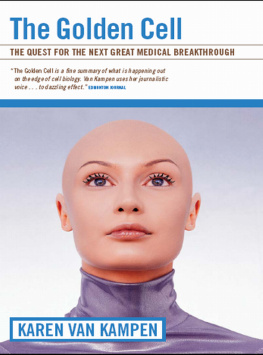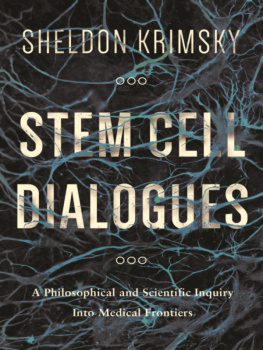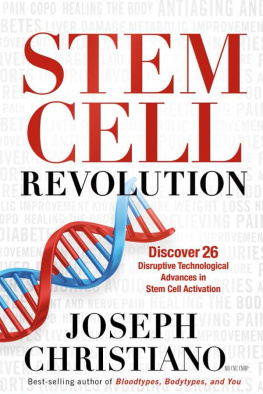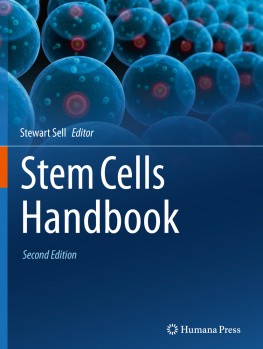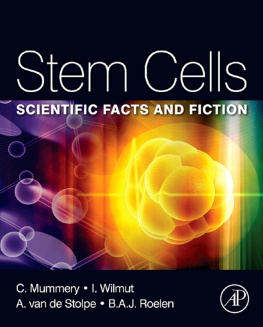Nagwa El-Badri - Regenerative Medicine and Stem Cell Biology
Here you can read online Nagwa El-Badri - Regenerative Medicine and Stem Cell Biology full text of the book (entire story) in english for free. Download pdf and epub, get meaning, cover and reviews about this ebook. year: 2020, publisher: Springer International Publishing, genre: Home and family. Description of the work, (preface) as well as reviews are available. Best literature library LitArk.com created for fans of good reading and offers a wide selection of genres:
Romance novel
Science fiction
Adventure
Detective
Science
History
Home and family
Prose
Art
Politics
Computer
Non-fiction
Religion
Business
Children
Humor
Choose a favorite category and find really read worthwhile books. Enjoy immersion in the world of imagination, feel the emotions of the characters or learn something new for yourself, make an fascinating discovery.
- Book:Regenerative Medicine and Stem Cell Biology
- Author:
- Publisher:Springer International Publishing
- Genre:
- Year:2020
- Rating:5 / 5
- Favourites:Add to favourites
- Your mark:
- 100
- 1
- 2
- 3
- 4
- 5
Regenerative Medicine and Stem Cell Biology: summary, description and annotation
We offer to read an annotation, description, summary or preface (depends on what the author of the book "Regenerative Medicine and Stem Cell Biology" wrote himself). If you haven't found the necessary information about the book — write in the comments, we will try to find it.
Regenerative Medicine and Stem Cell Biology — read online for free the complete book (whole text) full work
Below is the text of the book, divided by pages. System saving the place of the last page read, allows you to conveniently read the book "Regenerative Medicine and Stem Cell Biology" online for free, without having to search again every time where you left off. Put a bookmark, and you can go to the page where you finished reading at any time.
Font size:
Interval:
Bookmark:
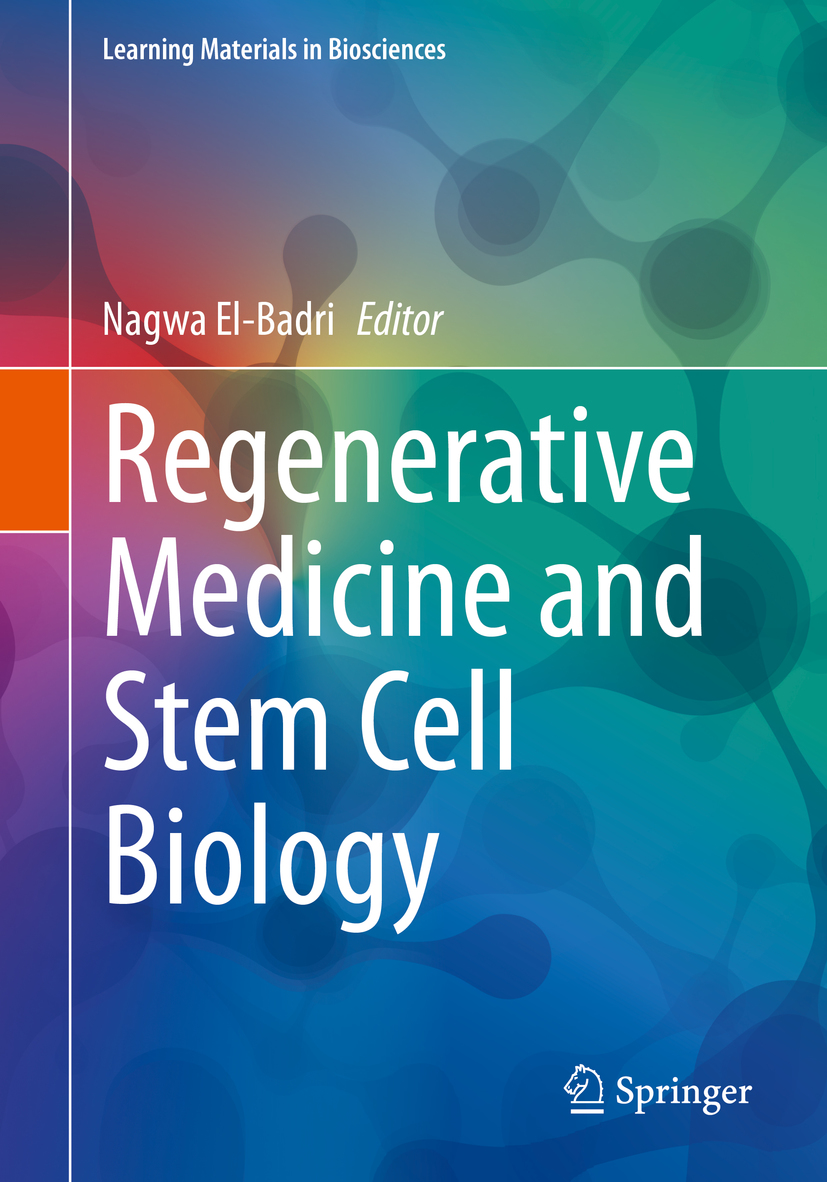
Learning Materials in Biosciences textbooks compactly and concisely discuss a specific biological, biomedical, biochemical, bioengineering or cell biologic topic. The textbooks in this series are based on lectures for upper-level undergraduates, masters and graduate students, presented and written by authoritative figures in the field at leading universities around the globe.
The titles are organized to guide the reader to a deeper understanding of the concepts covered.
Each textbook provides readers with fundamental insights into the subject and prepares them to independently pursue further thinking and research on the topic. Colored figures, step-by-step protocols and take-home messages offer an accessible approach to learning and understanding.
In addition to being designed to benefit students, Learning Materials textbooks represent a valuable tool for lecturers and teachers, helping them to prepare their own respective coursework.
More information about this series at http://www.springer.com/series/15430

This Springer imprint is published by the registered company Springer Nature Switzerland AG.
The registered company address is: Gewerbestrasse 11, 6330 Cham, Switzerland
The field of stem cells and regenerative medicine has expanded to include many disciplines in biology, medicine, physics, material science, biomedical engineering, and nanotechnology. This multidisciplinary approach necessitates acquiring knowledge that is contextual, practical, and focused on these new disciplines. This book provides an overview of the basic concepts of stem cell research and the important topics in the field that are of interest to students and also to researchers and physicians. The topics have been selected carefully to fulfill both the theoretical and practical aspects of stem cell research, in an approach that is beneficial to researchers who are interested to specialize in the field or to complement their research in other fields.
The introduction provides an overview of stem cells and the facts and hype about their usage in the clinic. Some diseases are prescribed stem cell transplantation as routine therapy, especially those of hematopoietic origin. Other therapeutic approaches are still experimental. At the forefront of diseases treated with stem cells are hematological disorders, leukemia, lymphoma, hemoglobinopathies, and immune deficiencies. Research on hematopoietic stem cells has been pioneering in delivering reliable therapy for blood disorders, and it comes as no surprise that almost all of the FDA-approved stem cell products are also of hematopoietic origin. The chapters on adult stem cells cover hematopoietic stem cells, mesenchymal stromal cells, endothelial progenitor cells, and pericytes and provide the reader with a good basis for understanding the biology and applications of these important cells.
The chapters on the epigenetic regulation of stem cells, cancer development and its regulation by cancer stem cells and associated stromal cells cover the molecular mechanisms that govern stem cell development and differentiation in health and disease. The same theme extends into the chapter on the use of stem cell therapy in the treatment of metabolic disorders, which provides a much-needed insight on regenerative therapy in the clinical setting, with a focus on diabetes as the most prevalent metabolic disease.
Many landmark experiments, from cloning frogs in the 1960s and mammalian cloning in the 1990s to the current direct cellular reprogramming and gene editing provided a more flexible and broader understanding of stem cell biology and of cell biology in general. Characterization of the embryonic stem cells and Yamanakas pioneering experiments in reprogramming somatic cells into induced pluripotent cells made stem cell therapy more achievable. It is now becoming more possible to manipulate mature cells on the genetic and epigenetic levels, to reverse their development and to regenerate their differentiation potential. This revolution in cell biology has not been matched unfortunately with a comparable clinical revolution, where patients have directly and similarly benefited from these unprecedented advances.
Advances in biotechnology, nanotechnology, and bioprinting have opened the doors to unlimited possibilities in regenerative medicine. Using natural and synthetic scaffolds fulfills the structural foundation of any organ on which cells are seeded and coaxed to differentiate and develop into the desired tissues. Bioprinting, 3D culture techniques, organ-on-a-chip, and other technical advances expanded the applications of stem cells well into personalized medicine. In vitro disease modeling and testing drugs on patient-specific tissues undoubtedly present a leap in precision medicine. Chapters discuss tissue engineering with detailed examples of bioscaffold preparation in the form of the decellularized human amniotic membrane. After its use with success in skin and corneal grafts, its attractive anti-inflammatory and antimicrobial properties and low immunogenicity support its use as a scaffold for stem cell growth and differentiation. Detailed protocol for bioscaffold preparation and other protocols for isolation and culture of mesenchymal stromal cells and induced pluripotent stem cells are also detailed.
The book concludes with a reminder for young scientists of following the basics of the scientific method, of adherence to ethical practices in their research, and of frequently questioning the methods and goals of their research. These practices tie directly with the introduction on the benefits of stem cell research and its applications, to maximize the hope and minimize the hype in this promising field.
Font size:
Interval:
Bookmark:
Similar books «Regenerative Medicine and Stem Cell Biology»
Look at similar books to Regenerative Medicine and Stem Cell Biology. We have selected literature similar in name and meaning in the hope of providing readers with more options to find new, interesting, not yet read works.
Discussion, reviews of the book Regenerative Medicine and Stem Cell Biology and just readers' own opinions. Leave your comments, write what you think about the work, its meaning or the main characters. Specify what exactly you liked and what you didn't like, and why you think so.

